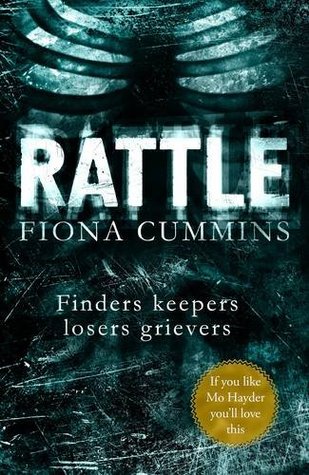2017
Pan Macmillan
Reviewer: Kerry James
Synopsis
A psychopath more frightening than Hannibal Lecter. He has planned well. He leads two lives. In one he’s just like anyone else. But in the other he is the caretaker of his family’s macabre museum.
Now the time has come to add to his collection. He is ready to feed his obsession, and he is on the hunt. Jakey Frith and Clara Foyle have something in common. They have what he needs. What begins is a terrifying cat-and-mouse game between the sinister collector, Jakey’s father and Etta Fitzroy, a troubled detective investigating a spate of abductions.
Set in London’s Blackheath, Rattle by Fiona Cummins explores the seam of darkness that runs through us all; the struggle between light and shadow, redemption and revenge.
Review by Kerry James
Being a serial killer would seem to be a defining factor. But in crime fiction, presumably to stop the character being one-dimensional and potentially boring as well as chilling, they tend to be given idiosyncrasies that individualise them, perhaps to remind us that they too are only too human.
In this novel, the killer is more rounded than many others of his ilk. He under a great compulsion to collect abnormal skeletons for preservation in the grim ossuary created in his father’s house. This obsession is a family tradition inherited in his father’s line so that he feels compelled to carry it out no matter how tired he is after working all day and having to look after an invalid wife. He genuinely loves his ageing pain wracked spouse, having first been attracted to her many years earlier by her crooked bones.
And so we have the Bone Collector. A woman, unconnected to the main characters, whose eyes met his in the afternoon dusk was reminded in that frozen moment ‘of her family’s elderly dog. He had died that summer after being eaten from the inside by maggots, an awful prolonged death by fly strike. When she had found [him], still alive but in shock, his eyes had been empty. As empty as this man’s….She forgot his face almost instantly’ (pp.11-12).
But more: this well-written novel is concerned with broken relationships as well as with the broken ravaged bodies that cause them. We travel between the Moyles, a well to do couple between whom communication has all but ceased. The wife shops and thinks of herself and her reputation, the husband makes money to keep their appearances together and he kerb crawls. Their five year old younger daughter is taken away from school on a day when nobody in this well-heeled family is around to pick her up by a tall greying thin stranger in the pinstriped suit with rust stains on the pockets. This brings the Moyles painfully into some sense of the reality of their situation.
More immediate in writing and emotional rawness, however, is the situation of the Friths. Their son, Jakey, suffers from Fibrosysplasia Ossificans Progressiva, or Stone Man Syndrome, a rare debilitating disease that causes sufferers to grow a second skeleton that traps them in a prison of bone, and for which there is no cure. Jakey’s mother, Lilith, has become frozen with fear from the possibility of injuries to her treasured boy which will cause him to grow more agonising an debilitating bone. She withdraws from her hapless but loving husband, Erdman, who as a result becomes even more of a loser. Jakey is snatched anyway.
Detective Sergeant Etta Fitzroy can scarcely believe what she is finding as she seeks the abductor of first the one and then the other child, and manages also to connect the events to the killing of a teenager some time before. The detection is sure and plausible and the solving of the mystery plausible.
At least as moving, however, is the way the Friths come to realise that to be afraid of life is not to live at all, and even the Moyles reach a new understanding of one another. The ending is not at all what one might expect and with one child still missing and the killer on the loose. Nevertheless, for broken couples to learn and to love again is no mean achievement. It is a worthwhile journey, perhaps not for the fainthearted who like their puzzles more abstracted from twisted bodies and suffering families.
